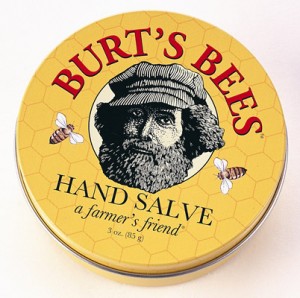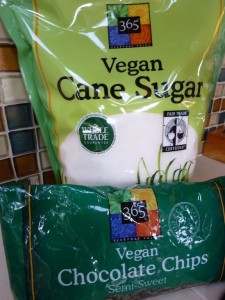Bee products, including bee pollen, propolis, and beeswax leave many vegans perplexed and unsure as to where to draw their ethical line. Many a time I’ve been on the brink of buying something that has a pretty little ‘vegan’ sticker on it only to find upon the cursory label check that it contains propolis or royal jelly or some such animal product. Some people who identify as ‘vegan’ do consume honey and other bee products but hardcore vegans do not due to the exploitation of bees in the making of many such items (and for other reasons of course). But don’t worry, tasty vegan goodies can still be made without the use of honey and other bee-derived substances!
What is Bee Propolis Anyway?
Propolis is actually a substance found in the buds of poplar trees and other trees with cones, making it, technically, vegan. However, the resinous substance is given the unique function by bees of sealing their hive to help protect against infection. Not only is this product not normally vegan due to it being taken from the beehive rather than from the trees themselves, but it is also possible that by procuring this substance the bee population is more open to attack by bacteria and viral invaders and, if we want to get dramatic, the whole ecosystem could collapse as a massive bee die-off happens for the sake of having a nice natural ingredient in lip balms. Whew!
Colony-Collapse Syndrome
Colony-collapse syndrome is a growing scourge with a number of possible culprits, namely pesticides, loss of biodiversity and natural resistance to infection, stress of bees moved across huge distances to ‘work’ at pollinating seasonal crops, and other issues. Even non-vegans may wish to avoid this stuff and give the bees a fighting chance so that they can carry on pollinating all those precious crops we like to gorge ourselves on.
Royal Jelly – Not Vegan
Royal Jelly is the Queen Bee’s food and is what helps her grow big and strong and stay that way in order to keep repopulating the hive. The substance is made in the salivary glands of other bees and has become a popular healthfood supplement in recent years. In a rather devious moment in a previous position working as an advisor in a healthfood store I convinced a customer that tiny syringes were used to extract Royal jelly from the bees’ salivary glands and that it was so expensive because it was such a painstaking process. Needless to say, I ‘fessed up and felt bad afterwards, still, once they knew where it came from and why the bees needed it they left with a different health tonic! Royal jelly, rather annoyingly, crops up in otherwise vegan supplements, thereby ruining a perfectly good product that I would otherwise consider taking and promote to others.
None of Your Beeswax – I’m Vegan!
Beeswax might keep your baubles and trinkets shiny and your lips glossy and gooey during winter but at what expense? A naturally-produced waxy residue created by honey bees (apis bees), beeswax is made up of fatty acid esters and long-chain alcohols in the (female) worker bees’ sternums in specialised glands. How on earth anyone went from that to producing polish or lip balm is beyond me… one to put in the file with fish in beer perhaps. The bees use the beeswax to construct the honeycomb as a handy storage system for the honey that we also then steal and replace with insipid sugar-water. They don’t call them worker bees for nothing.Honey
Honey is, of course, not vegan and yet plenty of people identifying as vegan will dance over the line occasionally and eat honey in various forms. Some only eat medicinal honey, such as manuka honey when sick or to control asthma symptoms, others may only eat local honey as a natural hayfever therapy. I can see how it is harder to identify with the suffering of bees in comparison to a fluffy lamb, especially considering the pain of a beesting (or so I’m told, having never been stung!), but even non-vegans might want to consider their honey consumption in terms of environmental impact. Animal ethics might not be all that persuasive to some folks, but human ethical considerations regarding world food shortages due to low pollination due to colony-collapse disorder should have everyone rethinking the overuse of bees in agriculture.
Sustainable Honey – A Vegan Apiarist?
An apiarist friend of mine told me years ago that a sustainable amount of honey for everyone in the world to eat each year was just one jar per person. Now, I’ve no idea where she got that figure from but I know that it takes bees approximately ten million foraging trips to make a pound of honey (454g) and that some of those trips are four miles or so, making that pot of honey pretty well travelled. Honey is not just a sweet and tasty treat though, it has a complex mix of amino acids and other nutrients that provide the bees with energy, and substances to promote healing and improve immunity. Using sugar water or syrup to feed the bees after stealing their carefully stored honey is also a consideration for those concerned with animal ethics; after all, most sugar is not vegan remember… and I’m guessing it’s unlikely that even your local apiarist is feeding organic, vegan certified sugar to their bees.Healthy Honey and Healthy Bees
Replacing that nutritious goop with sugar water means that the bees are bereft of good sustenance and, over time, become less healthy and less resilient to disease. Clever apiarists may manage to ameliorate some of the problems of beekeeping and keep an eye on disease development, and there is an argument for keeping bees in a fashion that is mutually beneficial, i.e. bee husbandry without actually eating the honey. However, honey is not vegan, and there are many other products derived from bees that are, again, not vegan. Just because they are mildly irksome when wearing a yellow t-shirt does not make it OK to exploit bees and keep them as slaves.
Honey Bee Dominion
Most honey does not originate from a bumbling apiarist in his or her back garden with a few hives. This is factory farming at a micro-managed level with millions of bees enslaved for man’s use. In a natural setting the queen bee would likely live five years or so and choose her replacement herself. In the decidedly unnatural setting of factory-farmed honey, the queen bee is usually killed off within two years and an artificially inseminated replacement installed to be more productive. This opens the bee colony up to all kinds of problems as natural selection is being, essentially, bypassed for our short-term convenience. Killing off the queen bee also helps the apiarists reduce the risks of swarming, aggression, mite infestation, and low productivity but such issues may not even be relevant if the other non-vegan bee products, such as propolis and royal jelly were not also being stolen from the colony simultaneously.
More information on the exploitation of bees can be found at Vegetus’s honey page for those interested in studies and the like. Meanwhile, remember that there are great alternatives for sweet-toothed vegans everywhere (date syrup, coconut sugar, agave, maple syrup) so even though honey is not vegan don’t despair, you can still make these delicious classic cupcakes with a maple syrup twist!
 Want carbon-neutral webhosting with great customer service? Try DreamHost and use code 'Vegans' for a third off!
Want carbon-neutral webhosting with great customer service? Try DreamHost and use code 'Vegans' for a third off!





{ 2 comments… read them below or add one }
Wow, this is so interesting, thanks for posting…. a former honey addict typing here. I had no idea about any of this – fascinating and scary at the same time.
This cleared it all up for me. I will no longer use the Nubian Heritage mango butter soap because it contains honey. It may smell like heaven, but I have enough personal issues, as I own feather earrings…. I don’t want to dig a deeper hole.
{ 1 trackback }